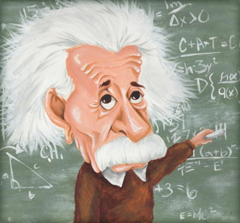Who likes to clean their bathroom? Survey says: More people than like to solve math problems!

These results from a study by Change the Equation, a nonprofit initiative to further math and science learning, raise concern about the state of STEM-related education in our schools. Massachusetts policy maker JD Chesloff argues that STEM skills should be taught earlier in children’s school careers, when they are natural-born scientists and engineers.
STEM stands for Science, Technology, Engineering and Math, representing important skills nearly everyone needs for success in today’s workforce.
Chesloff, the chair of Massachusetts’ STEM Advisory Council and chair of the state’s Board of Early Education and Care, cites the survey in an article he wrote for Education Week, titled “Why STEM education must start in early childhood.”
“It’s becoming increasingly difficult to define a STEM ‘job’,” Chesloff wrote. “Regardless of the industry – manufacturing, utilities, construction, technology, financial services – employers are looking for a talent pipeline that can produce workers proficient in the STEM disciplines.”
The survey he references makes clear that more than one-third of Americans would rather clean their toilet than do math. A separate survey revealed that 56 percent of middle schoolers would rather eat broccoli than do math.
“If math and science skills are such an important part of academic success, but people would rather be cleaning their bathroom or eating broccoli, I’d say we have a problem,” Chesloff said.
Kids are naturally curious, creative problem solvers – all characteristics at the heart of STEM disciplines, according to Chesloff. “Research shows that the brain is especially receptive to learning math and logic between the ages of 1-4, and that early math skills are the most powerful predictors of later learning.”
Looked at another way, young children who do not master basic math skills are more likely to struggle in every subject area as they go through school, according to a University of California, Irvine study.
Chesloff’s article refers to research that shows that high-quality early education reduces by half the rate of children held back a year in school and increases high school attendance by a third, college attendance by 80 percent and employment by 23 percent.
The goal is not to create a world of elementary school Einsteins but to lay a solid foundation for students as they progress through grade levels, ultimately resulting in true college and career readiness.
Introducing your kids to math, science and engineering skills does not have to be boring or without fun. Rolling toy cars down ramps and across bridges built with simple wooden blocks or Legos is just one quick example that’s probably more fun than a MIT lecture series.
Use clocks, calendars, magnets, scales, yardsticks and patterns around the house as tools – or toys – to introduce math and science concepts to your children. Play games such as dominoes or that perennial family favorite, Uno, as a way to strengthen math skills. Learning should be fun.
Go outside and look around. Backyards, playgrounds and the local park are alive with important science concepts you and your kids will enjoy learning. Cook a meal together, plant a garden, study the family pet up close, and ask lots of questions.
Note the emphasis on doing these things together. Your participation and enthusiasm helps reinforce the learning that goes on in these activities.
You can learn more from your local library or bookstore. The Everything Kids’ Science Experiments Book and Math Puzzles Book are just two from dozens of titles that share fun, age-appropriate activities that reinforce solid STEM principles.
Your kids may want to choose The Book of Totally Irresponsible Science: 64 Daring Experiments for Young Scientists. That negotiation is up to you, but it sounds very fun, and we don’t want to quench a curious mind, do we?
ADDITIONAL RESOURCES
Hundreds of websites and apps exist to help build stronger math and science skills in kids of all ages. Here are just a few to check out:
From the Wall Street Journal: Teach Kids Math and Science: The emphasis is on learning through fun activities on those cool gadgets
From NBC News: How drones teach kids science and math
The Everything Kids’ Math Puzzles Book: Brain Teasers, Games, and Activities for Hours of Fun
The Book of Totally Irresponsible Science: 64 Daring Experiments for Young ScientistsC
Einstein caricature courtesy of CeCe Holt, www.aboutfacesentertainment.com. Used with permission.
 Skip to Content
Skip to Content Capital Region BOCES
Capital Region BOCES


